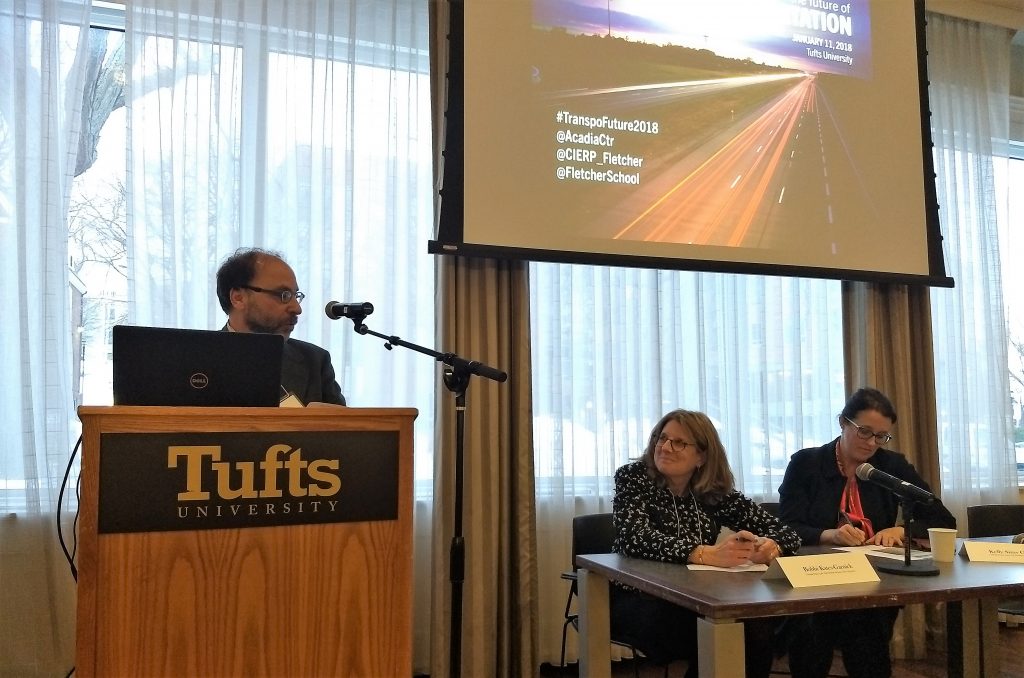
Climate Policy Lab Partners with Acadia Center for Transportation Conference
On January 11, 2018, stakeholders from across the northeast region gathered at The Fletcher School of Law and Diplomacy at Tufts University for “The Future of Transportation Symposium: Innovation, Technology & Policy.” Speakers discussed how the region can address transportation pollution, access, and innovation from academic, policy, and business perspectives. The one-day conference was co-hosted by Acadia Center and The Fletcher School’s Climate Policy Lab in the Center for International Environment and Resource Policy (CIERP), and in partnership with Transportation for Massachusetts (T4MA) and other allies.
Acadia Center’s president, Daniel Sosland, said, “To build a clean energy economy capable of tackling climate change, the northeast region must transition to electric vehicles and a low-carbon transportation system. This conference highlights the many opportunities states have to embrace clean transportation technologies through good policy, including a cap-and-invest program for the transportation sector. If designed correctly, such a program would reduce greenhouse gas emissions dramatically while improving quality of life for all residents. The variety of voices in the room speaks to the breadth of stakeholders transportation touches and the tremendous opportunity for positive impact on climate and society that it brings.”

“This symposium comes at a critical time for state and regional transportation policy,” noted Barbara Kates-Garnick, Fletcher School Professor of Practice and former Undersecretary of Energy for Massachusetts. “In recent months, states in the northeast and mid-Atlantic have shown a strong desire to take next steps toward a cleaner, more modern transportation system. This event offers a space for some of the brightest minds thinking about transportation policy to build on that momentum and identify next steps for progress.”
The conference followed the November announcement at COP23 in Bonn, Germany, by seven states—Massachusetts, Connecticut, Rhode Island, Delaware, New York, Maryland, Vermont, and Washington, D.C.—that they will explore regional climate policies for the transportation sector by holding listening sessions in the coming months. Massachusetts Governor Charlie Baker’s administration recently held several well-attended listening sessions, generating input from many members of the public and groups that want to see progress in this area. “The Future of Transportation Symposium” was an opportunity for stakeholders and policy makers to gather and discuss the best approaches and practices to shape state and regional transportation policy.
The symposium also highlighted the leadership of Massachusetts in working to promote modern, forward-looking transportation policies. Matthew Beaton, Secretary of Energy and Environmental Affairs, opened the day’s activities with an address about the future of transportation in Massachusetts and across the region.
The Symposium would not have happened without the efforts of many organizations, particularly special partner Transportation for Massachusetts and convening partners the Environmental League of Massachusetts and the Metropolitan Area Planning Council. Nor would it have been possible without the support of our sponsors Wynn Boston Harbor and Anbaric Development Partners.
For the Climate Policy Lab, this was a unique opportunity to make a connection between global issues and regional building blocks in transportation, which is essential to addressing climate change. The regional focus of the Symposium added insights and complexity to what the Lab is trying to achieve globally in its study of which energy and climate policies work, which don’t, and why. The Lab would like to thank everyone for contributing to this discussion about transportation, which is vital to smart planning for the future.
With representatives from climate policy, energy grid reform, environmental justice, and transit advocacy among others, Thursday’s event was an encouraging example of the power of cooperation across sectors, states, and walks of life. The full schedule and select presentations can be found here.
